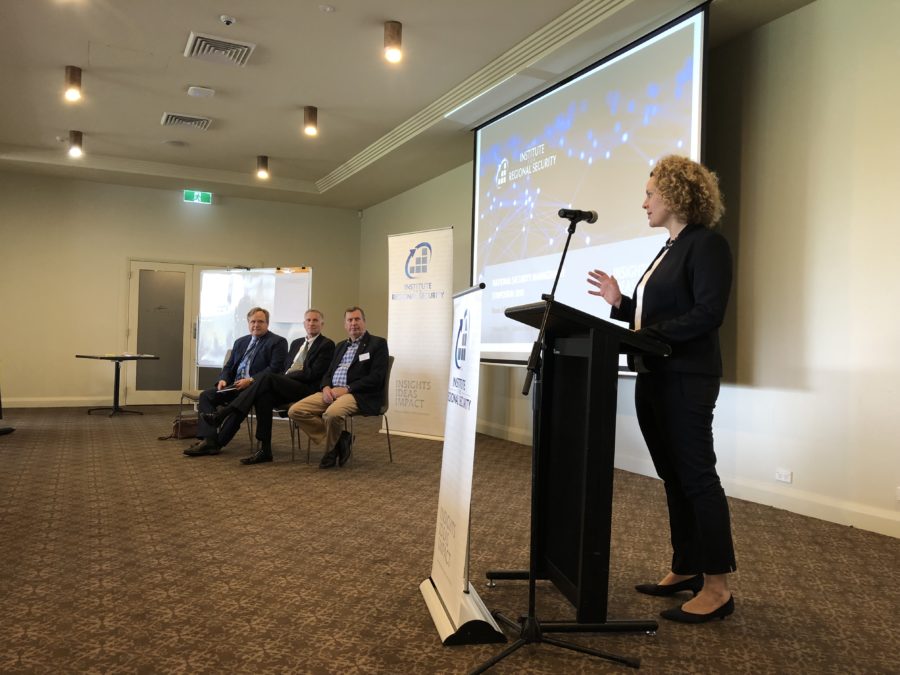8th March 2018 Canberra, Australia
Women in Security

The security world has a diversity problem. The number of women in senior security roles, within government (and beyond) while improving remains stubbornly low. The higher you go the worse it tends to get. By background I am more of a securocrat than a diplomat and have spent most of my career working on national security issues. With a rapidly evolving threat environment these are some of the most complex and important problems governments grapple with. But too much of that grappling is currently being done by men.
When I worked in the Home Office on counter-terrorism and organised crime, in large set-piece meetings the then Home Secretary and I were often the only women at the table with a speaking part. And the statistics bear this out. A recent study by the Institute for Government shows that the UK Civil Service is generally improving on gender diversity in senior roles (now 41%). This puts the UK at number four in the global Women Leaders Index, just behind Australia which comes in second. But dig a little deeper and progress is more mixed. Departments that lead, in a broad sense, on security issues tend to have the worst male to female ratios at senior levels; the Foreign and Commonwealth Office, the Home Office and the Ministry and Defence are all at the bottom of the pack (the Department for Exiting the EU doesn’t do well either but perhaps that’s a different story). Conversely senior women outnumber men in departments leading on so-called ‘softer’ issues such as education, culture and local government.
So what’s going on? Why, despite all of our efforts on diversity and inclusion (and there’s rightly a large focus on this in the Foreign Office) are we not shifting the dial more quickly? In the run up to International Women’s Day I’ve been reflecting on my own experience and asked a number of women in security roles in the UK and Australia how they see the key challenges. The main barriers appear to be:
- A perception that the security field is still a bit macho somehow: catching terrorists and criminals, stopping deadly plots, planning for doom-laden scenarios. It’s all a bit zero-sum. And linked to this a working-style where people don’t always feel empowered to challenge or ask questions. There is also still some mystique about how the security machine in government works and inserting yourself into that world and worrying that your next question may betray your lack of insight or experience can be off-putting. There is even research which suggests the sort of words that litter security job descriptions ‘high-powered’, ‘fast-paced’, ‘strong decision-maker’ can deter women.
- Concerns about flexible working and work-life balance. This was a real consideration for me after having children as I worried about taking on roles where I might be tethered to a high-classification system in the office. A number of women also noted that many roles seemed to require you to be ‘always on’ in case of events (e.g. a terrorist incident) and that was unattractive.
- More and more security roles are in technical fields particularly as the cyber threat grows. Women tend to be less represented in these areas resulting in a double-whammy when it comes to security.
- A lack of role models. There are plenty of impressive women in senior security and law enforcement roles both in the UK and Australia: Sarah MacIntosh, UK Permanent Representative to NATO; Lynne Owens, Director General of the National Crime Agency; Cressida Dick, Commissioner of the Metropolitan Police; Frances Adamson, Secretary of the Department for Foreign Affairs and Trade; and Nicole Rose Head of AUSTRAC, Australia’s financial intelligence agency. And I was delighted to see so many women at a Security Symposium on Australia’s new Home Affairs department today. But there are still not enough. Or, as one of my focus group put it; ‘you still have to be a 50-something white man to be taken seriously’.

This lack of diversity in security matters. Not just gender ratios, but diversity in all its dimensions; Black, Asian and Minority Ethnic (BAME), disability and socio-economic background. It is now well-documented (McKinsey and others) that more diverse organisations are more innovative, better able to attract top talent and, in the private sector, are more likely to achieve better financial results. Of course just being a women doesn’t mean you will be a more creative thinker or a better problem solver, but it’s one part of a more effective security mix.
This is also important externally. The UK and many other countries, including Australia, are increasingly focused on the importance of women in securing lasting, positive outcomes in conflict afflicted states. This is reflected in our updated National Action Plan on Women, Peace & Security published in January. We have also tended to focus less than we should on the role of women in counter-terrorism and preventing violent extremism, both as perpetrators (women are seen as less of a threat), victims and agents of positive change and resilience. The UK’s PREVENT programme is a good example of engaging women including as ‘first responders’ to radicalisation within communities.
So my top tips for women hesitating over a career in security:
– Find an inspiring role model or mentor. I underestimated this early on in my career, but it can make a huge difference. I probably wouldn’t have put myself forward for a number of roles unless someone had given me the confidence to go for it.
– Consider the wide range of jobs within the profession; policy, operations, information security, programme management. Given the nature of the threats we face, security will sadly remain a growth area for the foreseeable future. So there is real scope to find a niche which you enjoy and that matches your skills.
– It is possible to work flexibly. You might have to look more carefully at some roles, but in most you can do a large portion of your job, if you need to, out of the office. We also need to do more to address our ‘always-on’ working culture (if something is genuinely urgent a phone-call is better than working on the assumption people are glued to their smartphones). But this is not a problem that’s exclusive to the security world.
– Be confident and don’t worry about asking obvious questions or seeking clarification. If it’s not clear – it’s probably just not clear. You’re unlikely to be stepping inadvertently on a security taboo!
In short, there are a vast number of fascinating opportunities out there. It’s an area of work I feel passionate about and in which, alongside colleagues male and female, I hope I can make a difference.
*I am grateful for a number of people for their reflections on this topic, particularly Jane Marriott – Director, Joint International Counter-Terrorism Unit.
